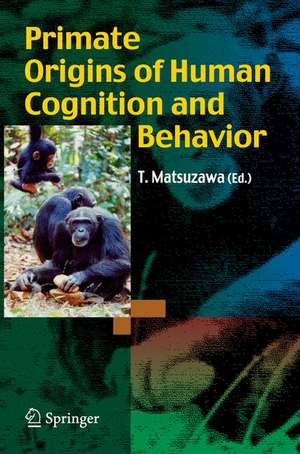Primate Origins of Human Cognition and Behavior
Editat de Tetsuro Matsuzawaen Limba Engleză Paperback – 30 iun 2008
| Toate formatele și edițiile | Preț | Express |
|---|---|---|
| Paperback (1) | 1401.33 lei 6-8 săpt. | |
| Springer – 30 iun 2008 | 1401.33 lei 6-8 săpt. | |
| Hardback (1) | 1237.93 lei 6-8 săpt. | |
| Springer – 31 mai 2001 | 1237.93 lei 6-8 săpt. |
Preț: 1401.33 lei
Preț vechi: 1708.94 lei
-18% Nou
Puncte Express: 2102
Preț estimativ în valută:
268.14€ • 279.96$ • 221.92£
268.14€ • 279.96$ • 221.92£
Carte tipărită la comandă
Livrare economică 04-18 aprilie
Preluare comenzi: 021 569.72.76
Specificații
ISBN-13: 9784431094227
ISBN-10: 4431094229
Pagini: 612
Ilustrații: XXI, 587 p.
Dimensiuni: 155 x 235 x 37 mm
Greutate: 1.03 kg
Ediția:1st ed. 2001. Corr. 2nd printing. 1st soft cover printing 2008
Editura: Springer
Colecția Springer
Locul publicării:Tokyo, Japan
ISBN-10: 4431094229
Pagini: 612
Ilustrații: XXI, 587 p.
Dimensiuni: 155 x 235 x 37 mm
Greutate: 1.03 kg
Ediția:1st ed. 2001. Corr. 2nd printing. 1st soft cover printing 2008
Editura: Springer
Colecția Springer
Locul publicării:Tokyo, Japan
Public țintă
ResearchDescriere
Biologists and anthropologists in Japan have played a crucial role in the development of primatology as a scientific discipline. Publication of Primate Origins of Human Cognition and Behavior under the editorship of Tetsuro Matsuzawa reaffirms the pervasive and creative role played by the intellectual descendants of Kinji Imanishi and Junichiro Itani in the fields of behavioral ecology, psychology, and cognitive science. Matsuzawa and his colleagues-humans and other primate partners- explore a broad range of issues including the phylogeny of perception and cognition; the origin of human speech; learning and memory; recognition of self, others, and species; society and social interaction; and culture. With data from field and laboratory studies of more than 90 primate species and of more than 50 years of long-term research, the intellectual breadth represented in this volume makes it a major contribution to comparative cognitive science and to current views on the origin of the mind and behavior of humans.
Cuprins
Foreword by Robert Seyfarth and Dorothy Cheney.- Preface by Tetsuro Matsuzawa.- Introduction to Comparative Cognitive Science: Primate foundation of human intelligence: A view from tool use in nonhuman primates and fossil hominids- Matsuzawa, T.- Phylogeny of Perception and Cognition: What you see is different from what I see: Species differences in visual perception- Fujita, S. Investigating visual perception and cognition in chimpanzees (Pan troglodytes) through the visual search and related tasks: from basic to complex processes- Tomonaga, M. Processing of the global and local dimensions of visual hierarchical stimuli by humans (Homo sapiens), chimpanzees (Pan troglodytes) and baboons (Papio papio)- Fagot, J. and Tomonaga, M. How do we eat?: Hypothesis of foraging strategy from the view point of gustation in primates- Ueno, Y.- Origin of Human Speech: Auditory Perception and Vocalization: Lemur vocal communication and the origin of human language- Oda, R. Vocal exchange of coo calls in Japanese macaques- Sugiura, H. Hearing and auditory-visual intermodal recognition of the chimpanzee- Hashiya, K. Early vocal development in a chimpanzee infant- Kojima, S.- Learning and Memory: Numerical competence in a chimpanzee: Cardinal and ordinal skills- Biro, D. and Matsuzawa, T. Reproductive memory processes in chimpanzees: Homologous approaches to research on human working memory- Kawai, N. and Matsuzawa, T. Establishment of line tracing on a touchmonitor as a basic drawing skill in chimpanzees (Pan troglodytes)- Iversen, I. And Matsuzawa, T. Object recognition and object categorization in animals- Jitsumori, M. and Delius, J.D..- Recognition of Self, Others, and Species: Mirror self-recognition in primates: an ontogenetic and a phylogenetic approach- Inoue-Nakamura. The level of self-knowledge in nonhuman primates: from the perspective of comparative cognitive psychology- Itakura, S. Self- and Other-control in Squirrel Monkeys- Anderson, J. Evolutionary Foundation andDevelopment of Imitation- Myowa-Yamakoshi, M. Species recognition by macaques measured by sensory reinforcement- Fujita, K. Evolution of human eyes as a device for communication- Kobayashi, H. Society and Social Interaction: A review of 50 years of research on the Japanese monkeys of Koshima: Status and dominance- Watanabe, K. Mother-offspring relationship in macaques- Nakamichi, M. The myth of despotism and nepotism: dominance and kinship in matrilineal societies of macaques- Matsumura, H. Decision making in social interactions by monkeys- Muroyama, Y.- Culture: 'Sweet-potato washing' revisited- Hirata, S., Watanabe, K., and Kawai, M. Tube test in free-ranging Japanese macaques: Use of sticks and stones to obtain fruit from a transparent pipe- Tanaka, I. Tool Use by Chimpanzees (Pan troglodytes) of the Arnhem Zoo Community- Takeshita, H. and van Hooff J.A.R.A.M. Ecology of tool use in wild chimpanzee: Toward a reconstruction of Early hominid evolution- Yamakoshi, G. Emergence of Culture in chimpanzees: education by master-apprenticeship- Matsuzawa, T., Biro, D. Humle, T., Inoue-Nakamura, N. Tonooka, R., and Yamakoshi, G.
Recenzii
From the reviews:
"The volume’s emphasis on studies of the common chimpanzee … reflects the long-standing interests of its editor, the not-so-common cognitive psychologist Tetsuro Matsuzawa. … Without question, this volume belongs on the desk of any student or researcher with a serious interest in primate behavior or comparative cognition. The editor has succeeded admirably in bringing together a coherent collection of important work." (Sarah Boysen, Science, Vol. 295, February, 2002)
"The volume’s emphasis on studies of the common chimpanzee … reflects the long-standing interests of its editor, the not-so-common cognitive psychologist Tetsuro Matsuzawa. … Without question, this volume belongs on the desk of any student or researcher with a serious interest in primate behavior or comparative cognition. The editor has succeeded admirably in bringing together a coherent collection of important work." (Sarah Boysen, Science, Vol. 295, February, 2002)
Caracteristici
The comparative approach covering the diversity of primate species to show the cognition and behavior of primates including humans
Both experimental approach and observational approach are combined
Both experimental approach and observational approach are combined











